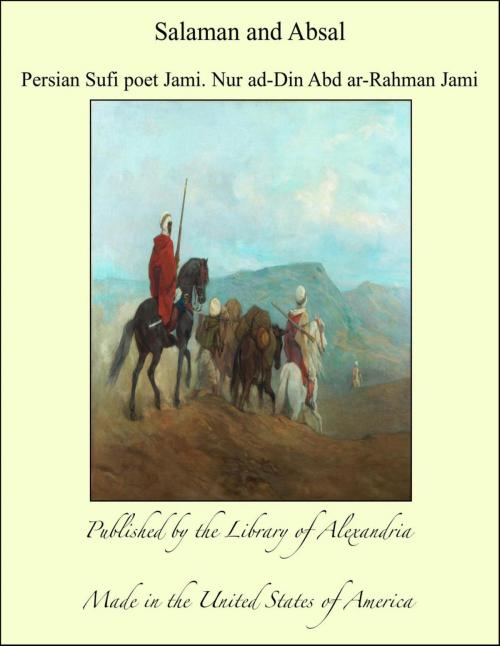| Author: | Persian Sufi poet Jami. Nur ad-Din Abd ar-Rahman Jami | ISBN: | 9781465578297 |
| Publisher: | Library of Alexandria | Publication: | March 8, 2015 |
| Imprint: | Language: | English |
| Author: | Persian Sufi poet Jami. Nur ad-Din Abd ar-Rahman Jami |
| ISBN: | 9781465578297 |
| Publisher: | Library of Alexandria |
| Publication: | March 8, 2015 |
| Imprint: | |
| Language: | English |
I hope the following disproportionate Notice of Jámi's Life will be amusing enough to excuse its length. I found most of it at the last moment in Rosenzweig's "Biographische Notizen" of Jámi, from whose own, and Commentator's, Works it purports to be gathered.] Núruddín Abdurrahman, Son of Maulána Nizamuddin1 Ahmed, and descended on the Mother's side from One of the Four great "Fathers" of Islamism, was born A.H. 817, A.D. 1414, in Jám, a little Town of Khorásan, whither (according to the Heft Aklím—"Seven Climates") his Grandfather had migrated from Desht of Ispahán, and from which the Poet ultimately took his Takhalus, or Poetic name, Jámi. This word also signifies "A Cup;" wherefore, he says, "Born in Jám, and dipt in the "Jam" of Holy Lore, for a double reason I must be called Jámi in the Book of Song." He was celebrated afterwards in other Oriental s—"Lord of Poets"—"Elephant of Wisdom," &c., but often liked to call himself "The Ancient of Herát," where he mainly resided. When Five Years old he received the name of Núruddín—the "Light of Faith," and even so early began to show the Metal, and take the Stamp that distinguished him through Life. In 1419, a famous Sheikh, Khwájah Mehmed Parsa, then in the last year of his Life, was being carried through Jám. "I was not then Five Years old," says Jámi, "and my Father, who with his Friends went forth to salute him, had me carried on the Shoulders of one of the Family and set down before the Litter of the Sheikh, who gave a Nosegay into my hand. Sixty years have passed, and methinks I now see before me the bright Image of the Holy Man, and feel the Blessing of his Aspect, from which I date my after Devotion to that brotherhood in which I hope to be enrolled."
I hope the following disproportionate Notice of Jámi's Life will be amusing enough to excuse its length. I found most of it at the last moment in Rosenzweig's "Biographische Notizen" of Jámi, from whose own, and Commentator's, Works it purports to be gathered.] Núruddín Abdurrahman, Son of Maulána Nizamuddin1 Ahmed, and descended on the Mother's side from One of the Four great "Fathers" of Islamism, was born A.H. 817, A.D. 1414, in Jám, a little Town of Khorásan, whither (according to the Heft Aklím—"Seven Climates") his Grandfather had migrated from Desht of Ispahán, and from which the Poet ultimately took his Takhalus, or Poetic name, Jámi. This word also signifies "A Cup;" wherefore, he says, "Born in Jám, and dipt in the "Jam" of Holy Lore, for a double reason I must be called Jámi in the Book of Song." He was celebrated afterwards in other Oriental s—"Lord of Poets"—"Elephant of Wisdom," &c., but often liked to call himself "The Ancient of Herát," where he mainly resided. When Five Years old he received the name of Núruddín—the "Light of Faith," and even so early began to show the Metal, and take the Stamp that distinguished him through Life. In 1419, a famous Sheikh, Khwájah Mehmed Parsa, then in the last year of his Life, was being carried through Jám. "I was not then Five Years old," says Jámi, "and my Father, who with his Friends went forth to salute him, had me carried on the Shoulders of one of the Family and set down before the Litter of the Sheikh, who gave a Nosegay into my hand. Sixty years have passed, and methinks I now see before me the bright Image of the Holy Man, and feel the Blessing of his Aspect, from which I date my after Devotion to that brotherhood in which I hope to be enrolled."















